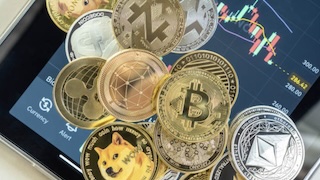Jun 06 (News On Japan) - In the realm of cryptocurrencies, tokens serve a myriad of purposes beyond simple payments. They have evolved to become powerful tools for transforming industries through innovative token utility.
By leveraging blockchain technology, tokens are revolutionizing traditional systems, processes, and industries in ways previously unimaginable. Innovative Token Utility is transforming industries by seamlessly connecting traders with educational experts through Immediate xGen Ai, an investment education firm. This platform provides invaluable resources, bridging the gap between investors and essential knowledge.
Token Utility Beyond Payments
Tokens are no longer confined to facilitating financial transactions; they have transcended their original purpose to encompass a wide range of utilities. From representing ownership rights to enabling access to services or products, tokens have become versatile assets with multifaceted uses. For instance, tokens can grant holders access to exclusive events, services, or even digital collectibles, thereby expanding their utility far beyond traditional payment systems.
Tokenization of Assets
One of the most significant advancements enabled by tokens is the tokenization of assets. Through blockchain technology, physical and digital assets such as real estate, artwork, and even stocks can be represented as tokens on a decentralized ledger. This process democratizes access to assets, making them more divisible, liquid, and accessible to a broader range of investors. Additionally, asset tokenization eliminates intermediaries, reducing costs and increasing efficiency in asset management and transactions.
Smart Contracts and Automation
Smart contracts, self-executing contracts with the terms of the agreement directly written into code, play a pivotal role in driving automation in various industries. By leveraging tokens as programmable units of value, smart contracts enable automated and trustless transactions, eliminating the need for intermediaries and streamlining processes. Industries such as supply chain management, insurance, and decentralized finance (DeFi) are leveraging smart contracts to automate tasks, reduce operational costs, and enhance transparency and accountability.
Decentralized Governance
Decentralized governance models powered by tokens are reshaping organizational structures and decision-making processes. Through mechanisms such as decentralized autonomous organizations (DAOs), stakeholders can participate in the governance of a platform or protocol by voting on proposals using tokens. This democratized approach to governance fosters community involvement, transparency, and consensus-driven decision-making, thereby mitigating centralization risks and empowering stakeholders.
Token-Based Incentive Systems
Tokens are increasingly being used to incentivize desired behaviors and actions within ecosystems. By rewarding users with tokens for contributing valuable resources or performing specific tasks, platforms can align incentives and stimulate engagement. Token-based incentive systems have been successfully implemented in various contexts, including social media platforms, decentralized applications (DApps), and decentralized finance protocols, driving user adoption and network growth.
Tokenization of Intellectual Property
The tokenization of intellectual property (IP) represents a paradigm shift in the way creative assets are owned, managed, and monetized. Through tokenization, creators can tokenize their IP rights, enabling fractional ownership, licensing, and royalty distribution in a transparent and immutable manner. This opens up new opportunities for creators to monetize their work, while also facilitating greater liquidity and accessibility in the IP market. Industries such as media, gaming, and publishing are exploring the potential of IP tokenization to revolutionize content creation and distribution.
Future Trends and Predictions
Looking ahead, the potential applications of innovative token utility are vast and evolving. As blockchain technology matures and adoption grows, we can expect to see further experimentation and innovation in token design and utility. Emerging trends such as non-fungible tokens (NFTs), decentralized identity, and token-curated registries (TCRs) are poised to reshape industries and redefine the concept of value exchange in the digital age. Additionally, the integration of blockchain technology with other emerging technologies such as artificial intelligence (AI), internet of things (IoT), and decentralized finance (DeFi) holds promise for unlocking new synergies and driving greater efficiencies across diverse sectors.
Conclusion
Innovative token utility is fundamentally changing the way we conceptualize value, ownership, and governance in the digital economy. By harnessing the power of blockchain technology and tokens, industries are undergoing a paradigm shift towards more decentralized, efficient, and inclusive systems. As we continue to explore the potential of tokens to transform industries, it is imperative to prioritize principles of transparency, inclusivity, and sustainability to ensure the long-term viability and impact of token-based innovations on society.















